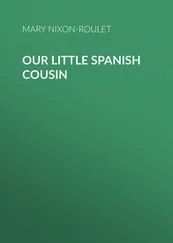Mary Wade - Mari, Our Little Norwegian Cousin
Здесь есть возможность читать онлайн «Mary Wade - Mari, Our Little Norwegian Cousin» — ознакомительный отрывок электронной книги совершенно бесплатно, а после прочтения отрывка купить полную версию. В некоторых случаях можно слушать аудио, скачать через торрент в формате fb2 и присутствует краткое содержание. Жанр: foreign_prose, foreign_language, на английском языке. Описание произведения, (предисловие) а так же отзывы посетителей доступны на портале библиотеки ЛибКат.
- Название:Mari, Our Little Norwegian Cousin
- Автор:
- Жанр:
- Год:неизвестен
- ISBN:нет данных
- Рейтинг книги:5 / 5. Голосов: 1
-
Избранное:Добавить в избранное
- Отзывы:
-
Ваша оценка:
- 100
- 1
- 2
- 3
- 4
- 5
Mari, Our Little Norwegian Cousin: краткое содержание, описание и аннотация
Предлагаем к чтению аннотацию, описание, краткое содержание или предисловие (зависит от того, что написал сам автор книги «Mari, Our Little Norwegian Cousin»). Если вы не нашли необходимую информацию о книге — напишите в комментариях, мы постараемся отыскать её.
Mari, Our Little Norwegian Cousin — читать онлайн ознакомительный отрывок
Ниже представлен текст книги, разбитый по страницам. Система сохранения места последней прочитанной страницы, позволяет с удобством читать онлайн бесплатно книгу «Mari, Our Little Norwegian Cousin», без необходимости каждый раз заново искать на чём Вы остановились. Поставьте закладку, и сможете в любой момент перейти на страницу, на которой закончили чтение.
Интервал:
Закладка:
Mary Hazelton Blanchard Wade
Mari, Our Little Norwegian Cousin
Preface
Long before Columbus discovered America, there were brave men in the north of Europe who dared to sail farther out upon the unknown waters of the Atlantic than any other people in the world. These daring seamen were called Vikings. Their home was the peninsula of Scandinavia, now ruled over by one king, although divided into two distinct countries, Norway and Sweden.
It was along the shores of Norway, with rugged mountains fringing its deep bays, that the Vikings learned command of their curious, high-prowed ships, and overcame all fear of wind and storm. Their strong nature shows itself to-day in the people of Norway, who patiently endure many hardships while trying to get a living on the rough mountain-sides or along the rocky coasts.
Many of our Norwegian cousins have come to America to make a new home for themselves where the sun shines more warmly and the winds blow less keenly. Their fair-haired children are growing up amongst us, showing us the qualities their parents most admire. Be brave, be honest, be kind to all creatures, be faithful to every little duty, – these are the lessons they have been taught from babyhood, as well as their brothers and sisters who have not as yet ventured far from the land they love so well, – the land of rapid-flowing rivers, deep, dark bays, and narrow valleys.
Come with me to-day to the home of one of these blue-eyed cousins and join her for a while in her work and play.
CHAPTER I
THE FARM
"Come, Mari, my little daughter, and you shall help me make the cakes," called her mother.
Mari stood in the middle of the big farm-yard with a flock of hens around her. She was scattering grain among them from a big bag on her arm; not a sound could be heard except once in a while the scratching of the hens' feet. They were too busy to notice each other or the big dog that sat on the door-step.
The little girl laughed quietly as she watched them. "They are so happy; they love this pleasant summer-time as much as I do," she said to herself.
But the moment she heard her mother's voice, she turned quickly toward the house without stopping a moment longer to see whether her pet hen, Biddy Wee, or cross old Yellow Legs got the most dinner. Mari never in her life thought of answering her parents by saying:
"Why, papa?" or "Why, mamma?" or "I'll come in a moment."
Mari lives in Norway, and Norwegian parents train their children to obey without delay.
The little girl was only too glad to come now, however. Her mother had promised she should learn to make flat-bread to-day. She was pleased that she was old enough to be trusted with this important work. Why, she could keep house alone when she had mastered this necessary art, and her mother could leave her in charge.
Mari remembers when she was such a tiny tot that her head barely reached above the table. Even then she loved to watch her mother as she sat at the big moulding-board, rolling out the dough until it was nearly as thin as paper.
This dough was made of barley-meal which was raised here at the farm. It was rolled out into sheets almost as wide as the table itself, for each cake must be about a half-yard across. Then came the cooking. The cake was lifted from the board to a hot flat stone on the fireplace, where it was quickly baked. How fast the pile grew! and how skilful mother always was. She never seemed to burn or break a single cake.
Wherever you go in Mari's country you will find flat-bread. You can eat quantities of it, if you like, yet somehow it will not easily check your hunger, and it gives little strength.
"Now, dear, be careful not to get a grain of dust on the floor," said her mother, as Mari stood at the table ready for directions.
The child looked very pretty, with her long, light hair hanging down her back in two braids. The snowy kerchief was tied under her chin just as it was when she came in from the farm-yard. She had no need to put on an apron before beginning her work, for she already wore one. She was never without it, in fact, and hardly thought herself dressed in the morning until her apron had been fastened around her plump little waist.
Her cheeks looked rosy enough to kiss, but such a thing seldom happened, for mothers in Norway believe that is a bad habit. They think that it often leads to the carrying of disease from one person to another.
"Shake hands with the baby and the children," they would say, "but please don't kiss them." They are wise in this, – don't you think so?
Before Mari had rolled out six cakes, her cheeks grew rosier yet. It was hard work, although it had seemed easy enough when mother was doing it.
The first three cakes had to be rolled over and over again because they would stick to the board. Then the lifting was not such a simple thing as Mari had supposed before she came to do it herself. But she kept trying. Her mother was very patient and encouraged her with loving smiles and kind words. At last the little girl made a really good cake and landed it all by herself on the stone, without doubling, or even wrinkling, it.
"Good, good," said her mother, "you will soon be a real helper, Mari. But now you have worked long enough for the first time. I will finish the baking while you take the baby and give him an airing."
And where was the baby, bless him? Mari knew, for she went at once to the other side of the room where a pole was fastened into the wall. A big basket was hanging down from the end of this pole, and in the basket was a little blue-eyed baby, cooing softly to himself.
Mari's mother was a very busy woman. There was always something to do, either inside the house or out-of-doors. She had very little time for holding a baby. So when Mari and her brothers were away at school, and mother was left alone, that dear little rosy-cheeked fellow sometimes began to cry in a very lively manner. The cooking and the cheese-making and the spinning must go on just the same, and time could not be spent in holding a baby.
But he must be amused in some way. So the strong pole was fastened into the wall, and the cradle attached to the end. Do you wonder what fun there could be in staying up in that basket, hour after hour? The baby enjoyed it because the pole would spring a little at every movement of his body. As long as he kept awake, he could, and did, bob up and down. That was amusement enough.
He was glad to see Mari now. She was a perfect little mother, and soon had his hood and cloak fastened on. They were hardly needed, for he was already done up in so many garments, it didn't seem possible he could be cold, wherever he went.
The living-room, where Mari had been working, was large and high. The beams were dark with age, but the floor was white from the many scrubbings Mari's mother had given it.
On one side of the room was the big fireplace where all the cooking was done. During the long winter evenings the family and servants sat in front of the blazing logs and told stories of the famous sea-captains of the olden times. Or perhaps they talked of the fairies and giants, in whom Mari firmly believed. Her mother laughed at the idea of these wonderful creatures. Yet, after all, it was not more than a hundred years ago that they seemed real to many grown-up people.
Wonderful creatures who made themselves seen from time to time dwelt in the mountains, the fields, and the rivers. This is what Mari's great-grandma had believed, and was she not a sensible woman? It is no wonder, therefore, that our little cousin loved to think that these beings were still real. When she went to sleep at night, she often dreamed of the gnomes who live far down in the earth, or the giants who once dwelt among the mountains.
Читать дальшеИнтервал:
Закладка:
Похожие книги на «Mari, Our Little Norwegian Cousin»
Представляем Вашему вниманию похожие книги на «Mari, Our Little Norwegian Cousin» списком для выбора. Мы отобрали схожую по названию и смыслу литературу в надежде предоставить читателям больше вариантов отыскать новые, интересные, ещё непрочитанные произведения.
Обсуждение, отзывы о книге «Mari, Our Little Norwegian Cousin» и просто собственные мнения читателей. Оставьте ваши комментарии, напишите, что Вы думаете о произведении, его смысле или главных героях. Укажите что конкретно понравилось, а что нет, и почему Вы так считаете.












